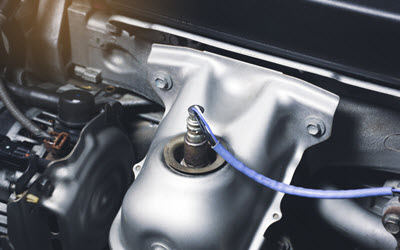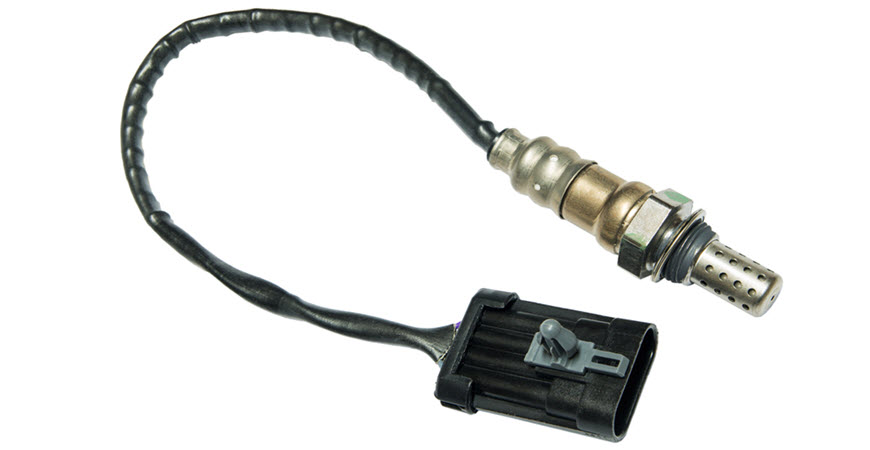The oxygen sensor is an integral part of modern vehicles, including Volkswagen cars. It is commonly abbreviated as the O2 sensor, and it is in charge of monitoring and regulating the air-fuel ratio in the engine. This sensor is strategically positioned in the exhaust system to monitor the oxygen content in the exhaust gases. It measures the unburned oxygen and relays this information to the engine control unit (ECU).
Based on the oxygen levels detected, the ECU makes real-time adjustments to the fuel injection system. It fine-tunes the air-fuel ratio to achieve the ideal balance for efficient combustion. By precisely regulating the air-fuel mixture, the O2 sensor ensures your Volkswagen operates at peak efficiency while minimizing harmful emissions. When this sensor malfunctions, it affects your VW’s performance.
3 Signs That Your O2 Sensor Is Failing
- Lowered fuel economy: An O2 sensor malfunction disrupts the accurate adjustment of the fuel mixture in your Volkswagen’s engine. This discrepancy leads to an imbalance in the air and fuel ratio, causing increased fuel consumption and a noticeable drop in fuel efficiency.
- Rough Idling or Poor Performance: A failing sensor can disrupt the engine’s smooth operation. You might experience rough idling, where the engine feels unstable or uneven when running at idle. Additionally, your Volkswagen might exhibit poor performance, showing signs of hesitation or jerking movements, especially during acceleration. This lack of power can be a direct result of an imbalanced air-to-fuel ratio due to the malfunctioning sensor.
- Increased Emissions: When an O2 sensor fails, it usually leads to an increase in harmful emissions. Higher levels of pollutants, such as carbon monoxide and hydrocarbons, are released into the environment through the exhaust. This poses an environmental concern and also serves as a clear indicator of an underlying issue that needs immediate attention.
Common Causes of O2 Sensor Failure
- Age and Wear: O2 sensors, like many components, degrade over time due to prolonged exposure to extreme temperatures and the corrosive nature of exhaust gases. The typical lifespan of an O2 sensor ranges from 50,000 to 100,000 miles, but this duration can vary based on driving conditions, such as frequent short trips or prolonged idling, which might accelerate wear and tear.
- Contaminants in Fuel: Impurities present in fuel, such as sulfur, can wreak havoc on the O2 sensor’s delicate components. These contaminants compromise the sensor’s accuracy and functionality, leading to potential malfunctions over time. Using high-quality, clean fuel is crucial to safeguarding the sensor’s performance.
- Oil or Coolant Contamination: Leaks in the engine that allow oil or coolant to reach the O2 sensor can trigger its malfunction. The infiltration of these substances can swiftly degrade the sensor’s performance, affecting its ability to accurately measure oxygen levels in the exhaust gases.
- Connector Issues: Faulty wiring or connections between the O2 sensor and your VW’s electrical system can disrupt the sensor’s signals. This interference leads to inaccurate readings or complete sensor failure.
How to Resolve O2 Sensor Issues
- Diagnostic Scan: Use specialized diagnostic tools to conduct a comprehensive scan of your Volkswagen’s systems. Modern Volkswagens boast advanced diagnostic capabilities that aid in pinpointing the faulty O2 sensor. These tools generate error codes that specifically identify the problematic sensor, streamlining the diagnosis process.
- Sensor Replacement: Once the faulty sensor is identified, the most common solution is to replace it. Opt for OEM (Original Equipment Manufacturer) sensors for compatibility and reliability. This replacement ensures the restoration of accurate readings and optimal engine performance.
- Professional Assistance: Seeking help from a certified Volkswagen technician ensures accurate diagnosis and proper installation of the replacement sensor. Professional expertise guarantees optimal performance and avoids potential errors during the sensor replacement process.
Denver’s Premier Destination for O2 Sensor Diagnostics and Repairs
At DART auto, we take pride in being the premier  destination for Volkswagen owners in Denver, CO, seeking top-notch repair services. Our team comprises qualified and certified mechanics who excel in diagnosing O2 sensor issues in Volkswagens. With high-quality and expertise, we thoroughly assess your vehicle’s O2 sensor to determine whether it requires replacement or not.
destination for Volkswagen owners in Denver, CO, seeking top-notch repair services. Our team comprises qualified and certified mechanics who excel in diagnosing O2 sensor issues in Volkswagens. With high-quality and expertise, we thoroughly assess your vehicle’s O2 sensor to determine whether it requires replacement or not.
Equipped with state-of-the-art diagnostic equipment and specialized tools tailored for Volkswagen repairs, our garage ensures accurate and efficient servicing of your car. Whether it’s diagnosing intricate sensor malfunctions or conducting comprehensive repairs, our technicians are equipped to handle it all. If you reside in Englewood, Littleton, Centennial, or anywhere in the Denver area, trust our skilled technicians to cater to your car maintenance and repair needs. Your Volkswagen’s well-being is our priority at DART auto. Don’t wait for issues to escalate. Book an appointment with our trusted technicians today.
